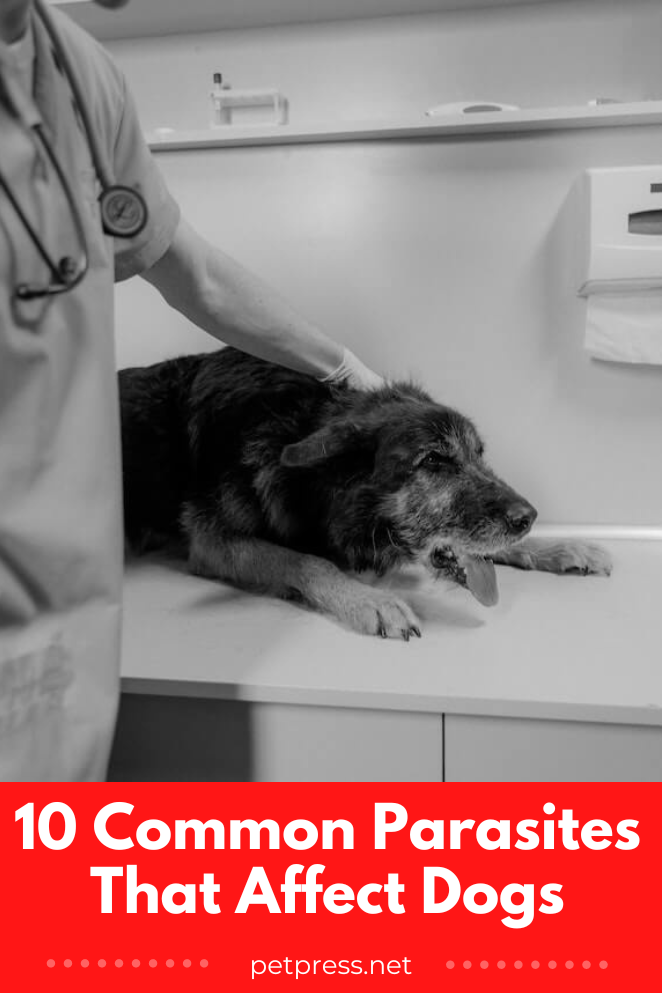
It’s an unfortunate fact of life—parasites can affect our beloved canine companions. What are some of the more common parasites that can affect dogs?
Well, there are a few critical culprits to be aware of – fleas, ticks, mites, and worms. These little buggers can cause a wide range of issues. From minor irritation to serious illness and even death if left unchecked.
Fortunately, with proper identification and treatment, this doesn’t have to be your pooch’s fate! Read on for more information about these common canine parasites.
What are some common parasites that can affect dogs?

Parasites are a common problem among dogs and can cause serious health issues if left untreated.
Knowing the symptoms of the most frequent parasites in dogs is important. This is so that you can take steps to prevent or treat them.
Here we discuss 10 of the most common parasites that affect dogs and what owners should watch out for:
1. Heartworms:
These are potentially deadly worms that live in the heart, lungs, and associated blood vessels of affected animals.
They’re transmitted through mosquito bites. They can cause coughing, fatigue, weight loss, difficulty breathing, and even congestive heart failure if left untreated.
Treatment involves a series of injections given over months; prevention is key with year-round preventive medications like Heartgard Plus or Sentinel.
2. Fleas:
These tiny, wingless parasites feed on the blood of their host. They cause itching, skin irritation, and sometimes even anemia in severe infestations.
Controlling fleas requires a combination of environmental and medical treatments; there are many excellent over-the-counter products available to help fight flea outbreaks.
3. Roundworms:
One of the most common intestinal parasites in puppies (and adult dogs), these worms can cause diarrhea, vomiting, weight loss, and abdominal discomfort.
They’re easily treated with medication but prevention is always best so it’s important to keep your dog up-to-date on their deworming schedule.
4. Hookworms:
Another common intestinal parasite, hookworms feed on the blood of their host and can cause anemia, bloody diarrhea, and vomiting.
Treatment is available in oral or injectable medications and prevention includes regular deworming and avoiding contaminated environments where these worms are found.
5. Whipworms:
These tiny worms live in the large intestine of affected animals and cause colitis (inflammation of the colon) which can lead to diarrhea, weight loss, anemia, dehydration, and even death if left untreated.
Treatment requires a combination of medication and symptomatic care; it’s important to practice good hygiene around your dog to avoid recurrence.
6. Tapeworms:
Another type of intestinal worm that can be passed from other animals or through ingestion of fleas, tapeworms can cause mild stomach discomfort and weight loss.
Treatment involves a specific medication given orally or by injection; good hygiene practices are also important to avoid recurrence.
7. Giardia:
These single-celled organisms cause a variety of gastrointestinal symptoms including diarrhea, vomiting, bloating, and abdominal pain in affected animals.
Treatment typically requires a combination of antiparasitic medications and supportive care such as fluid therapy; prevention includes avoiding contaminated water sources your dog may consume while outdoors.
8. Coccidia:
Another single-celled organism that affects the intestines, coccidia is especially common in puppies but can affect any age dog.
Symptoms may include anorexia, intermittent diarrhea, dehydration, and abdominal discomfort; treatment is available in both oral and injectable medications.
9. Mites:
These tiny parasites can cause a variety of skin problems depending on the type of mite involved.
Common symptoms are intense itching, redness, scabs or sores on the skin, and hair loss; different types of mites require different treatments so it’s important to get your dog diagnosed by a veterinarian as soon as possible if you suspect they have a mite infestation.
10. Lyme Disease:
This serious bacterial infection is spread through tick bites and can cause fever, joint pain, lethargy, lameness, swollen lymph nodes, kidney disease, and other serious complications.
Treatment usually involves a series of antibiotics; prevention is key with tick preventives like Frontline or Advantix.
Can a human get a parasite from a dog?

Yes, humans can get parasites from dogs—but not in the way you might think! While it’s rare, a person could contract a parasitic infection if they come into contact with an infected dog’s stool or saliva.
But don’t worry—there are steps you can take to protect yourself and your furry friend. Regularly deworming your pup and always washing your hands after handling pet waste can go a long way in preventing any issues.
So keep your pup healthy and happy, and enjoy all the cuddles without worries!
Conclusion

Overall, there are many common parasites that can affect even the healthiest dogs. Now that you know What are some common parasites that can affect dogs you can help your dog live a healthy life by preventing these parasites.
Some of these parasites can be easily prevented through proper hygiene and preventive care measures such as regular deworming and the use of flea and tick control products.
However, it is still important to stay vigilant for signs of parasite infection in your dog. If you suspect your furry companion may have become infected with any of the aforementioned parasites, contact your veterinarian to receive the best possible treatment plan for them.
By understanding these common parasites that can affect dogs and following the recommended preventive measures to protect your pet from them, you’ll be able to keep your canine


GIPHY App Key not set. Please check settings